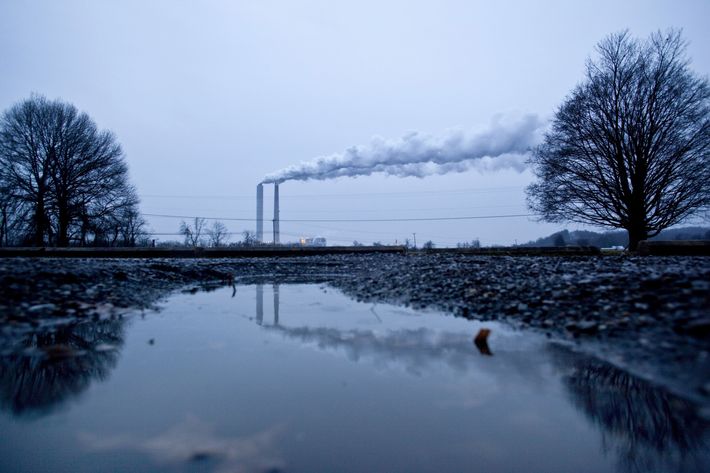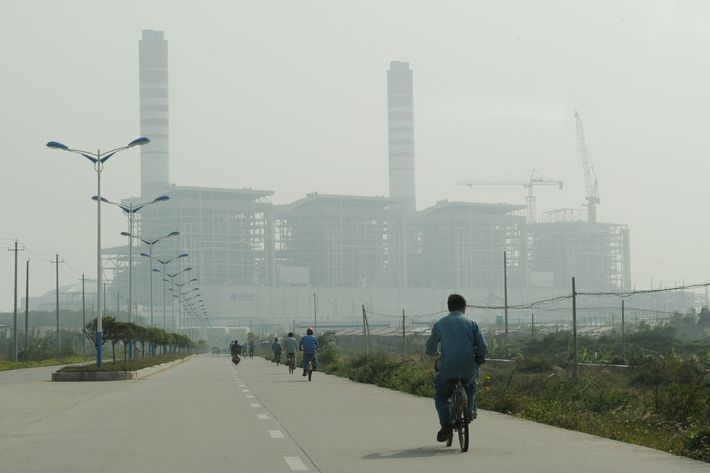
On Friday, 12 states filed suit to block the Obama administration’s Clean Power Plan. Rep. Mike Kelly (R-PA) has an op-ed in yesterday’s Wall Street Journal endorsing the lawsuit and laying out an unofficial political manifesto of sorts on its behalf. Kelly’s op-ed neither denies nor accepts the validity of climate science. Rather, it offers up a pastiche of political and economic reasons to oppose regulatory action, or any action at all, to mitigate climate change. As such, it represents something close to the cutting edge of Republican Party thinking on the issue.
Having picked through Kelly’s verbiage, three substantive public-policy arguments, or approximations of public policy arguments, emerge:
1. Energy prices will go through the roof. Kelly:
As the new regulations take effect, Americans could see their electric bills increase annually by more than 10%—$150 for the average consumer—by the end of the decade, according to the American Action Forum.
Nope. The study mentioned — authored by the conservative American Action Forum — doesn’t really say that Obama’s new regulations on coal plants will increase electricity prices by 10 percent. It arrives at this figure by adding the projected costs of all of Obama’s energy regulations, past and present.
The AAF study reports that Obama’s newest power-plant regulations would increase retail electricity prices by 5.9 percent to 6.5 percent by 2020. The figure is taken from the EPA’s own analysis. But even that lower figure overstates the costs. The EPA projects that retail electricity prices will rise by that level, but that use will fall because the regulations are designed to encourage efficiency. The agency projects electricity costs to run 2.7 to 3.2 percent higher, total.
And that very small increase in costs would be more than offset by savings from healthier air — fewer asthma attacks, fewer premature deaths, and so on.
Even if we take Kelly’s obviously inflated figure purely at face value, he is arguing that the Clean Carbon Plan would cause electricity costs to rise by $150 a year, or $12.50 a month, for the average person by 2020. This may be the least-terrifying scare tactic I have ever seen.

2. Businesses will suffer and have to lay off workers. Kelly:
According to the Heritage Foundation, the result of the EPA’s proposed rule “will be fewer jobs and less income for American families.” A study by the foundation released in June predicts that the EPA’s anti-coal crusade could terminate 600,000 American jobs by 2023 while dampening economic growth by more than $2 trillion.
The following five words are the best tip-off that you’re about to encounter an invalid citation: “According to the Heritage Foundation …” And sure enough, when you click over to the Heritage study, it concedes, “While not directly modeling the EPA’s regulations, Heritage Foundation analysts modeled the economic effects of a phase-out of coal between the years 2015 and 2038, which is what EPA’s GHG regulations would effectively do.” You have to appreciate the almost brilliantly understated tone of this caveat. When you’re allegedly a think-tank, you can’t just come out and say, “We measured a different plan than the actual one and are pretending it’s basically the same thing,” or “We decided to make up some numbers.” Instead you say that your study was “not directly modeling the EPA’s regulations.”
The think-tank modeled a “phase-out” of coal, except that the actual plan does not phase out coal but is instead projected to reduce its use by 30 percent, which is quite different from reducing it by 100 percent. According to my own figures, reading the Heritage study reduces your intelligence quotient by 25 points, although I should note that, while not directly modeling the effect of reading the study itself, I modeled the effects of dropping a sack of bricks onto one’s skull from a second-story window.
3. Unilateral reductions are pointless. Kelly:
What is the point of all this pain? China and India, not the United States, are the biggest emitters of carbon dioxide from coal. China alone has increased coal production by more than 24% since 2005, according to the Energy Information Administration, while the U.S. power sector’s carbon emissions have declined by 15%.
This is a common but bizarre allocation of blame. The United States has emitted far more carbon into the atmosphere than India or China — indeed, more than India and China combined. The United States continues to emit several times more carbon per person than either China or India. Since China and India have vastly more people and are industrializing, they are likely to increase their per-capita emissions over time. I have seen no morally cogent explanation as to why the entire burden of sparing the world from runaway global warming should fall on the countries that have contributed the least to its existence. Developing countries have already made the significant concession that they will not be allowed to follow the cheap dirty-energy developmental path used by the West.

Kelly continues:
The New Republic puts it this way: “The goal of these regulations is not to stop global warming, but to prove to the international community that the U.S. is ready to pay additional costs to combat climate change.” In other words, the Obama administration expects the American people to sacrifice for the sake of mere symbolism.
In other words, no, that’s completely wrong. Given that, as noted above, people in developing countries are giving up a chance to use a proportionate share of the world’s historic carbon budget, minimal reciprocity dictates that the United States make some contribution. The Obama administration expects the American people to sacrifice in order to secure the agreement of people in other countries to sacrifice. That’s how collective action works.
Reading Kelly’s op-ed, one searches in vain for any minimal attempt to grapple with the costs of allowing the unlimited free dumping of carbon into the atmosphere. The degeneration of the GOP’s climate policy is almost total. A party that six years ago was converging on mainstream climate economics can now muster nothing more than feeble gestures that bear only the vaguest resemblance to actual thought.






























